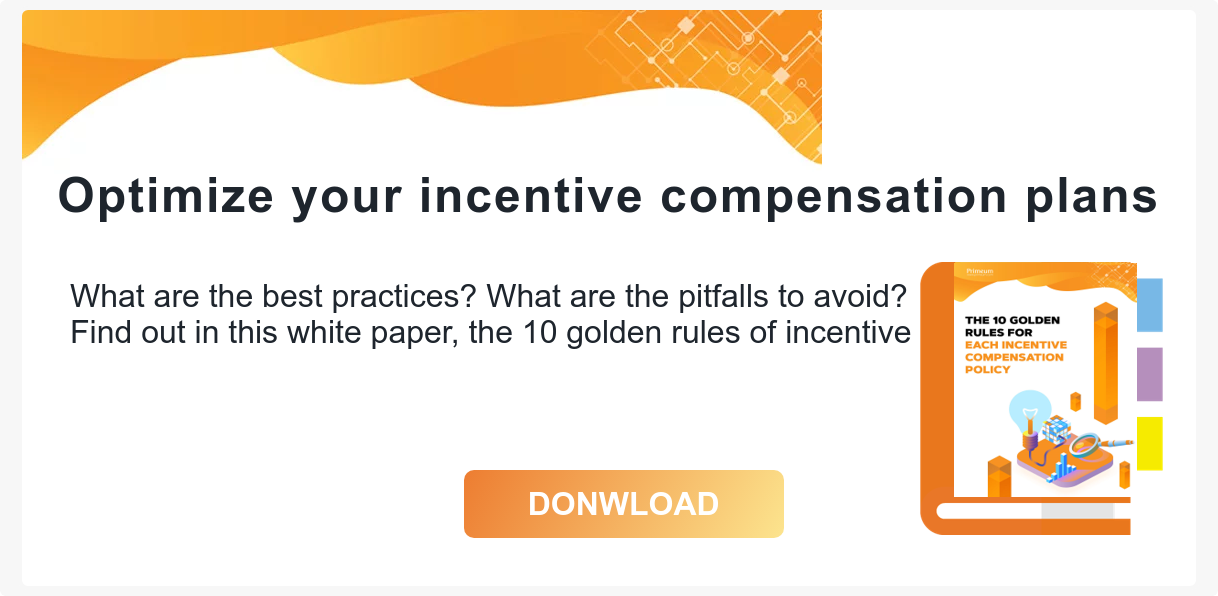Your sales-force incentive compensation scheme must be well constructed if you want it to make sense and motivate your staff. And to achieve this, your system will need to be based on three fundamental pillars: sales-force job satisfaction, global business strategy and financial health. Find out if your incentive compensation scheme is effective and, if necessary, how to improve it.
Sales-force job satisfaction is the most reliable performance indicator for an incentive compensation scheme.
Sales staff are generally the first employees to benefit from an incentive compensation scheme. So make sure that the set objectives are rational and coherent, that their income can really evolve and that staff are not looking to move on.
Realistic objectives
One of the first signs that your incentive compensation scheme might need some adjustment would be that your sales staff fail to reach their objectives. If this continues and concerns all of your staff then you must reconsider your sector’s overall economic configuration such that you can evaluate your company’s true growth potential. This will allow you to set a realistic and coherent national objective and this will be the first essential step towards setting realistic individual objectives for your sales staff.
The compensation must be able to evolve
Your sales staff must see that their wages can truly evolve for the incentive compensation scheme to have a motivational impact. If the wages received by your staff fail to increase then this will mean that your company performance is being held back. Evidently the bonuses can be harmonised, especially if they are calculated from the first euro of turnover.
However the incentive compensation scheme must incite the sales force to seek out new customers. The main thing is to find the right balance between increasing the loyalty of existing customers and the bonuses that will be received for each new contract signed. Finding the right relation between the two is essential for putting together an effective incentive compensation scheme.
A way to make holding on to your staff and recruiting new talent easier
In the current employment climate, a lot of businesses are having trouble holding on to their staff and this combines with the increasing complexity now involved in recruiting new talent. An incentive compensation scheme is an effective indicator of how attractive your company could be to new talent. If your company’s best sales-staff are leaving you should see this as a serious warning as regards the effectiveness of your incentive compensation scheme. For the sales force it is the attraction of the bonuses and the quality of the services and products they are in charge of that will be far more important to them than workplace atmosphere or management quality.
A high staff turnover is a clear sign that the incentive compensation scheme is not encouraging performance. You will really have to revise your bonus scheme if you want to hold on to your staff and maintain your employer brand in the eyes of potential candidates.
The bonus scheme’s framework is your global business strategy
Bonuses concern more than the individuals who receive them. They need to be an integral part of the company’s overall strategy and calibrated such that they benefit the whole of the company. You need to make sure that the incentive compensation is a real subject of discussion and that it remains constantly in phase with the company’s goals.
Incentive compensation should not be taboo
An effective incentive compensation scheme is a scheme that makes a lot of noise! If it really is attractive it will maintain tension amongst staff and keep their motivation at a higher level. Faced with the challenge, they will need to stretch themselves to reach their objectives and be recompensed for their work.
And to achieve this, managers must be able to communicate about the incentive compensation scheme. The motivation of the sales force will depend significantly on the bonus scheme’s transparency. The rules need to be clearly set out and fully understood by management, who in turn will need to be able to discuss them openly and unreservedly with staff.
It is essential that the whole of the incentive compensation scheme is included in the sales-force roadmap. If the bonus scheme is not a natural subject of discussion, then this will mean that it is either excessively complex or is not sufficiently understood by management.
Performance indicators must suit the market
For your incentive compensation scheme to make sense, the performance indicators will need to be aligned with company’s global business strategy. The whole of your bonus scheme will need to adapt to whether you are doing business in a growth market or a mature market.
For your incentive compensation scheme to make sense, the performance indicators will need to be aligned with company’s global business strategy. The whole of your bonus scheme will need to adapt to whether you are doing business in a growth market or a mature market.
The company’s financial health, an essential criterion when setting up an incentive compensation scheme
Incentive compensation needs to be used with care for it to be effective. Over-complicated, vague or approximate rules, or just a badly calculated budget, can really put a company’s financial health at risk. So you will need to be careful to avoid mistakes or misunderstandings as much as possible when you set up your bonus scheme.
You must not go over-budget
Bonus pay-outs must not endanger the company’s financial health. It is essential that the incentive compensation amount is calibrated to suit the company’s current business growth. The provisional budget calculation for the bonuses must be coherent and realistic; and always in keeping with the national objective. The company must be able to apply the incentive compensation scheme rules without ever going over budget.
Incentive compensation must be fair
Incentive compensation is all about balance. There is the risk that a bonus scheme will generate binary effects if it turns out to be difficult to achieve. The incentive compensation must boost everyone’s performance. If some get the highest bonuses that the scheme can provide, whilst others do not then the latter will surely be frustrated. Once more this will significantly increase the risk or losing staff. Incentive compensation must be clearly understood and specifically designed to stimulate staff as well as being a highly effective way to motivate them.
The risk of calculation errors is quite low
A good incentive compensation scheme must be as easy to understand as possible. If there is an accumulation of HR rule interpretation or data entry errors then this means that there are too many calculation rules, HR rules and performance indicators involved. There will be no surprise when this leads to misunderstandings and an incorrect application of the system as a whole.
The consequences will be felt immediately: malcontent staff, over-payments and vast amounts of time wasted by the payroll department. These negative effects will be only made worse if the incentive compensation applied to the sales force is then extended to cover support functions without any adaptation.
Clarity and simplicity must be the watchwords when setting up an incentive compensation scheme. The aim is to avoid calculation errors where possible, simplify everyone’s jobs and, above all, build up a trusting relationship with staff.
An effective, rational and motivating incentive compensation scheme can be put together if these three fundamental pillars and their associated rules are respected. The bonus scheme as a whole will make sense if it suits the staff and allows the company to meet its objectives. Otherwise a thorough revision will be necessary.





